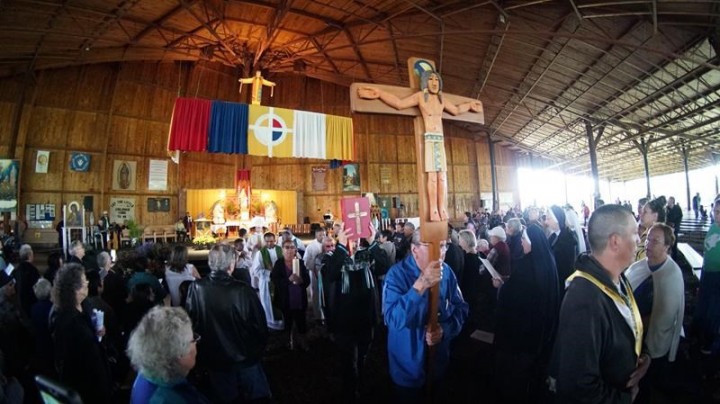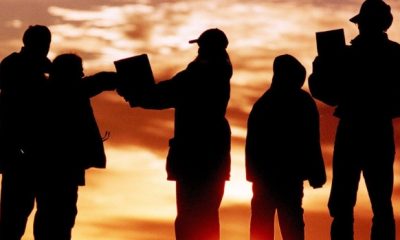News
‘Largest spiritual Indigenous gathering’ to return during Pope’s visit to Alberta

|
|
LAC STE. ANNE, Alta. — Rev. Garry LaBoucane remembers going to Wakamne — or God’s Lake — during the Lac Ste. Anne pilgrimage as a boy.
“It was always a family tradition,” the 74-year-old said in an interview from Vancouver, where he’s a Métis priest at Sacred Heart Parish.
He remembers sleeping in a pup tent near the cemetery with his grandfather, attending Latin church services he didn’t understand and meeting people from all walks of life.
“It was a social time, visiting with family,” LaBoucane said before the Vatican announced a visit to the sacred lake west of Edmonton would be part of Pope Francis’ planned trip to Canada next month.
“It’s a pilgrimage, a time to pray, a time to be with other nations. It’s the largest spiritual Indigenous gathering in North America.”
The annual pilgrimage had grown to about 40,000 people in 2019 — the year before it shut down due to the COVID-19 pandemic. It’s to resume in person this year from July 25 to 28.
The papal visit is set to start in Edmonton on July 24, move on to the Quebec City area on July 27 and end in Iqaluit on July 29. It is to include public and private events with an emphasis on Indigenous participation.
Before the Pope’s plans were confirmed, Rev. Les Kwiatkowski said in an interview that there was a lot of talk about a potential visit from the pontiff.
“Many people are very excited, but also this could bring even more healing and more reconciliation,” he said.
Lac Ste. Anne has been considered sacred for many generations and has become known as a place of healing.
The oral history from the Alexis Nakota Sioux Nation suggests a chief from the southeast followed his vision and led his people to the shores of the lake.
An annual pilgrimage was organized by a priest in 1889 and has continued annually during the week of July 26, which is the feast day of St. Anne, mother of the Virgin Mary. The grandmother figure is said to have strong importance within Indigenous culture.
The pontiff is to celebrate an open-air mass at Commonwealth Stadium, home to the Edmonton Elks football team, that day and travel to Lac Ste. Anne in the early evening.
Kwiatkowski, who has attended the pilgrimage every summer since 1990 when he moved from Poland, said he has heard from many people across Western Canada who are excited to come this year.
“People need that, there’s no doubt,” he said. “It’s not only spiritual, it’s also social.
“They come to worship, they come to pray, they come for healing. They also come to spend time together.”
Half of those who attend, he said, come from isolated communities and that’s the only time they get to see their friends and relatives.
“It’s a beautiful spirit,” said Kwiatkowski.
He has heard stories about family traditions and about miracles.
“Every day when doing the pilgrimage, someone will come to you and say, ‘It helped me to forgive, it helped me to heal from the past, it helped me to understand things more,’” said Kwiatkowski.
“Healing is more than physical healing. It’s the whole being. For people who come — sometimes very far they have to travel to get here — it’s a special time of healing, of finding themselves.”
LaBoucane said it’s also known as a place of physical healing — even featuring spots where people have left their crutches.
His parents had a similar experience when he was a child.
“I had eczema really, really bad,” said LaBoucane, who hasn’t had any problems since that visit.
Kwiatkowski agreed it’s a special place, especially the lake’s water.
“It has huge significance for Indigenous people,” he said. “People take gallons of this water, they take it home. They use this water for many different reasons — for strength and for healing.
“It has huge significance.”
At a news conference Thursday alongside Edmonton’s archbishop, LaBoucane said he welcomed news of the Pope’s upcoming visit with great joy.
“People are looking forward to being with him, praying with him at Lac Ste. Anne.”
This report by The Canadian Press was first published June 26, 2022.
— By Colette Derworiz in Calgary, with files from Brittany Hobson in Winnipeg
The Canadian Press
News
Fires in Happy Valley-Goose Bay under control with no current risk of explosion – CBC.ca


A statement released Saturday morning from Happy Valley-Goose Bay RCMP says the fires in the town and on the Canadian Forces Base are now under control and there is no risk of explosion.
As well, Mayor George Andrews announced that the state of emergency has been lifted and evacuated residents are now permitted to return to their homes.
“We implore the general public to remain away from the area as we have firefighters and other first responders at the scene in the coming hours and days,” Andrews said.
“And we just ask the public not to engage in any activity up around the Canadian side,” he said, referring to the North side of the community.
The police say firefighters battled the blaze, which caused extensive damage to a number of commercial structures, throughout the night. No one was injured.
A fire broke out in a former airport hangar in Happy Valley-Goose Bay late Friday, which sparked a number of explosions as well as an evacuation and an official state of emergency.
Andrews says the fire department was assisted by a number of groups, including the military.
“Early this morning our firefighters stood down a little,” Andrews told CBC News on Saturday. “We have a crew here who are battling some hotspots.”
“This looks to me to be a predominantly clean up site,” Andrews said, regarding the damage caused by the fire. “Now, we will be probably on-site here for a number of days because of just the sheer heat and things within that old hanger. If you can imagine, this is a huge old military aircraft hanger.”
“The fire started in a couple of buildings that were on the back of an old hanger that sits at the airfield on the north side,” said Andrews. “It caused the the hanger that was next door to be engulfed… That hanger is not there anymore.”
Andrews said it’s too early to determine what caused the fire.
“This was a huge, huge effort on behalf of all our emergency services which were engaged and our crews fought very hot, very uncomfortable conditions through the night,” he said.
Download our free CBC News app to sign up for push alerts for CBC Newfoundland and Labrador. Click here to visit our landing page.
News
Canada Child Benefit payment on Friday | CTV News – CTV News Toronto


More money will land in the pockets of Canadian families on Friday for the latest Canada Child Benefit (CCB) installment.
The federal government program helps low and middle-income families struggling with the soaring cost of raising a child.
Canadian citizens, permanent residents, or refugees who are the primary caregivers for children under 18 years old are eligible for the program, introduced in 2016.
The non-taxable monthly payments are based on a family’s net income and how many children they have. Families that have an adjusted net income under $34,863 will receive the maximum amount per child.
For a child under six years old, an applicant can annually receive up to $7,437 per child, and up to $6,275 per child for kids between the ages of six through 17.
That translates to up to $619.75 per month for the younger cohort and $522.91 per month for the older group.
The benefit is recalculated every July and most recently increased 6.3 per cent in order to adjust to the rate of inflation, and cost of living.
To apply, an applicant can submit through a child’s birth registration, complete an online form or mail in an application to a tax centre.
The next payment date will take place on May 17.
News
Capital gains tax change draws ire from some Canadian entrepreneurs worried it will worsen brain drain – CBC.ca
A chorus of Canadian entrepreneurs and investors is blasting the federal government’s budget for expanding a tax on the rich. They say it will lead to brain drain and further degrade Canada’s already poor productivity.
In the 2024 budget unveiled Tuesday, Finance Minister Chrystia Freeland said the government would increase the inclusion rate of the capital gains tax from 50 per cent to 67 per cent for businesses and trusts, generating an estimated $19 billion in new revenue.
Capital gains are the profits that individuals or businesses make from selling an asset — like a stock or a second home. Individuals are subject to the new changes on any profits over $250,000.
The government estimates that the changes would impact 40,000 individuals (or 0.13 per cent of Canadians in any given year) and 307,000 companies in Canada.
However, some members of the business community say that expanding the taxable amount will devastate productivity, investment and entrepreneurship in Canada, and might even compel some of the country’s talent and startups to take their business elsewhere.
Finance Minister Chrystia Freeland unveiled the government’s 2024 federal budget, with spending targeted at young voters and a plan to raise capital gains taxes for some of the wealthiest Canadians.
Benjamin Bergen, president of the Council of Canadian Innovators (CCI), said the capital gains tax has overshadowed parts of the federal budget that the business community would otherwise be excited about.
“There were definitely some other stars in the budget that were interesting,” he said. “However, the … capital gains piece really is the sun, and it’s daylight. So this is really the only thing that innovators can see.”
The CCI has written and is circulating an open letter signed by more than 1,000 people in the Canadian business community to Trudeau’s government asking it to scrap the tax change.
Shopify CEO Tobi Lütke and president Harley Finkelstein also weighed in on the proposed hike on X, formerly known as Twitter.
We need to be doing everything we can to turn Canada into the best place for entrepreneurs to build 🇨🇦<br><br>What’s proposed in the federal budget will do the complete opposite. Innovators and entrepreneurs will suffer and their success will be penalized — this is not a wealth tax,…
—@harleyf
Former finance minister Bill Morneau said his successor’s budget disincentivizes businesses from investing in the country’s innovation sector: “It’s probably very troubling for many investors.”
Canada’s productivity — a measure that compares economic output to hours worked — has been relatively poor for decades. It underperforms against the OECD average and against several other G7 countries, including the U.S., Germany, U.K. and Japan, on the measure.
Bank of Canada senior deputy governor Carolyn Rogers sounded the alarm on Canada’s lagging productivity in a speech last month, saying the country’s need to increase the rate had reached emergency levels, following one of the weakest years for the economy in recent memory.
The government said it was proposing the tax change to make life more affordable for younger generations and fund efforts to boost housing supply — and that it would support productivity growth.
A challenge for investors, founders and workers
The change could have a chilling effect for several reasons, with companies already struggling to access funding in a high interest rate environment, said Bergen.
He questioned whether investors will want to fund Canadian companies if the government’s taxation policies make it difficult for those firms to grow — and whether founders might just pack up.
The expanded inclusion rate “is just one of the other potential concerns that firms are going to have as they’re looking to grow their companies.”


He said the rejigged tax is also an affront to high-skilled workers from low-innovation sectors who might have taken the risk of joining a startup for the opportunity, even taking a lower wage on the chance that a firm’s stock options grow in value.
But Lindsay Tedds, an associate economics professor at the University of Calgary, said the tax change is one of the most misunderstood parts of the federal budget — and that its impact on the country’s talent has been overstated.
“This is not a major innovation-biting tax change treatment,” Tedds said. “In fact, when you talk to real grassroots entrepreneurs that are setting up businesses, tax rates do not come into their decision.”
As for productivity, Tedds said Canadians might see improvements in the long run “to the degree that some of our productivity problems are driven by stresses like housing affordability, access to child care, things like that.”
‘One foot on the gas, one foot on the brake’
Some say the government is sending mixed messages to entrepreneurs by touting tailored tax breaks — like the Canada Entrepreneurs’ Incentive, which reduces the capital gains inclusion rate to 33 per cent on a lifetime maximum of $2 million — while introducing measures they say would dampen investment and innovation.
“They seem to have one foot on the gas, one foot on the brake on the very same file,” said Dan Kelly, president of the Canadian Federation of Independent Business.
Some business groups are worried that new capital gains tax changes could hurt economic growth. But according to Small Business Minister Rechie Valdez, most Canadians won’t be impacted by that change — and it’s a move to create fairness.
A founder may be able to sell their successful company with a lower capital gains treatment than otherwise possible, he said.
“At the same time, though, big chunks of it may be subject to a higher rate of capital gains inclusion.”
Selling a company can fund an individual’s retirement, he said, which is why it’s one of the first things founders consider when they think about capital gains.
Mainstreet NS7:03Ottawa is proposing a hike to capital gains tax. What does that mean?
Tuesday’s federal budget includes nearly $53 billion in new spending over the next five years with a clear focus on affordability and housing. To help pay for some of that new spending, Ottawa is proposing a hike to the capital gains tax. Moshe Lander, an economics lecturer at Concordia University, joins host Jeff Douglas to explain.
Dennis Darby, president and CEO of Canadian Manufacturers & Exporters, says he was disappointed by the change — and that it sends the wrong message to Canadian industries like his own.
He wants to see the government commit to more tax credit proposals like the Canada Carbon Rebate for Small Businesses, which he said would incentivize business owners to stay and help make Canada competitive with the U.S.
“We’ve had a lot of difficulties attracting investment over the years. I don’t think this will make it any better.”
Tech titan says change will only impact richest of the rich


Toronto tech entrepreneur Ali Asaria will be one of those subject to the expanded capital gains inclusion rate — but he says it’s only fair.
“It’s going to really affect the richest of the rich people,” Asaria, CEO of open source platform Transformer Lab and founder of well.ca, told CBC News.
“The capital gains exemption is probably the largest tax break that I’ve ever received in my life,” he said. “So I know a lot about what that benefit can look like, but I’ve also always felt like it was probably one of the most unfair parts of the tax code today.”
While Asaria said Canada needs to continue encouraging talent to take risks and build companies in the country, taxation policies aren’t the most major problem.
“I think that the biggest central issue to the reason why people will leave Canada is bigger issues, like housing,” he said.
“How do we make it easier to live in Canada so that we can all invest in ourselves and invest in our companies? That’s a more important question than, ‘How do we help the top 0.13 per cent of Canadians make more money?'”
-
Media23 hours ago
DJT Stock Rises. Trump Media CEO Alleges Potential Market Manipulation. – Barron's
-
Investment24 hours ago
Private equity gears up for potential National Football League investments – Financial Times
-
Real eState16 hours ago
Botched home sale costs Winnipeg man his right to sell real estate in Manitoba – CBC.ca
-
News22 hours ago
Canada Child Benefit payment on Friday | CTV News – CTV News Toronto
-
Business24 hours ago
Gas prices see 'largest single-day jump since early 2022': En-Pro International – Yahoo Canada Finance
-
Business16 hours ago
Dow Jones Rises But S&P, Nasdaq Fall; Nvidia, SMCI Flash Sell Signals As Bitcoin's Fourth Halving Arrives – Investor's Business Daily
-



 Science21 hours ago
Science21 hours agoMarine plankton could act as alert in mass extinction event: UVic researcher – Langley Advance Times
-



 Science14 hours ago
Science14 hours agoDragonfly: NASA greenlights most important mission of the century – Earth.com












